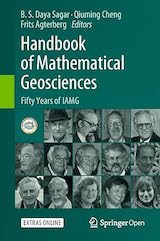
|
FreeComputerBooks.com
Links to Free Computer, Mathematics, Technical Books all over the World
|
|
- Title: Handbook of Mathematical Geosciences
- Author(s): B.S. Daya Sagar, Qiuming Cheng, Frits Agterberg
- Publisher: Springer; 1st ed. 2018 edition (July 16, 2018); eBook (Creative Commons Licensed)
- License(s): Creative Commons License (CC)
- Paperback/Hardcover: 942 pages
- eBook: PDF and ePub
- Language: English
- ISBN-10: 3319789988
- ISBN-13: 978-3319789989
- Share This:

|
This Open Access handbook published at the IAMG's 50th anniversary, presents a compilation of invited path-breaking research contributions by award-winning geoscientists who have been instrumental in shaping the IAMG.
About the Authors- N/A
 Similar Books:
Similar Books:
-
 Geographic Data Science with R: Visualizing and Analyzing
Geographic Data Science with R: Visualizing and Analyzing
This book provides a series of tutorials aimed at teaching good practices for using Time Series and geospatial data to address topics related to environmental change. It is based on the R language and aims at data scientists.
-
 R for Geographic Data Science (Stefano De Sabbata)
R for Geographic Data Science (Stefano De Sabbata)
This book introduces readers to tools in the R programming language for accessing and analyzing Census data from the United States Census Bureau and shows how to carry out demographic analyses in a single computing environment.
-
 Applied Spatial Data Analysis with R (Roger S. Bivand, et al)
Applied Spatial Data Analysis with R (Roger S. Bivand, et al)
It presents R packages, functions, classes and methods for handling spatial data, and showcases more specialised kinds of spatial data analysis, including spatial point pattern analysis, interpolation and geostatistics, areal data analysis and disease mapping.
-
 Geocomputation with R (Robin Lovelace, et al.)
Geocomputation with R (Robin Lovelace, et al.)
This book is for people who want to analyze, visualize and model geographic data with open source software. It is based on R, a statistical programming language that has powerful data processing, visualization, and geospatial capabilities.
-
 R for Data Science: Visualize, Model, Transform, Tidy, Import
R for Data Science: Visualize, Model, Transform, Tidy, Import
This book teaches you how to do data science with R: You'll learn how to get your data into R, get it into the most useful structure, transform it, visualize it and model it, how data science can help you work with the uncertainty and capture the opportunities.
-
 R Graphics Cookbook: Practical Recipes for Visualizing Data
R Graphics Cookbook: Practical Recipes for Visualizing Data
This cookbook provides more than 150 recipes to help scientists, engineers, programmers, and data analysts generate high-quality graphs quickly - without having to comb through all the details of R's graphing systems.
-
 Geospatial Analysis with Python (Ujaval Gandhi)
Geospatial Analysis with Python (Ujaval Gandhi)
Suitable for GIS practitioners with no programming background or python knowledge. The course will introduce basic Python programming concepts, libraries for spatial analysis, geospatial APIs and techniques for building spatial data processing pipelines.
-
 Python Scripting for Spatial Data Processing (Pete Bunting, et al)
Python Scripting for Spatial Data Processing (Pete Bunting, et al)
This book is a Python tutorial for beginners aiming at teaching spatial data processing. It is used as part of the courses taught in Remote Sensing and GIS, using psycopg2, and ogr2ogr, etc., at Aberystwyth University, UK.
-
 Geospatial Analysis: Principles, Techniques and Software Tools
Geospatial Analysis: Principles, Techniques and Software Tools
This book provides a compehensive guide to concepts, methods and tools, with many examples being provided using a variety of software tools such as ArcGIS, Idrisi, Grass, Surfer and many others to clarify the concepts discussed
-
 Efficient R Programming: Practical Guide to Smarter Programming
Efficient R Programming: Practical Guide to Smarter Programming
This book is about increasing the amount of work you can do with R in a given amount of time. It's about both computational and programmer efficiency. This book is for anyone who wants to make their use of R more reproducible, scalable, and faster.
-
 Cookbook for R: Best R Programming TIPs (Winston Chang)
Cookbook for R: Best R Programming TIPs (Winston Chang)
The goal of this cookbook is to provide solutions to common tasks and problems in analyzing data. Each recipe tackles a specific problem with a solution you can apply to your own project, and includes a discussion of how and why the recipe works.
-
 Hands-On Programming with R: Functions and Simulations
Hands-On Programming with R: Functions and Simulations
This book not only teaches you how to program, but also shows you how to get more from R than just visualizing and modeling data. You’ll gain valuable programming skills and support your work as a data scientist at the same time.
-
 R Programming for Data Science (Roger D. Peng)
R Programming for Data Science (Roger D. Peng)
This book is about the fundamentals of R programming. Get started with the basics of the language, learn how to manipulate datasets, how to write functions, and how to debug and optimize code. You will have a solid foundation on data science toolbox.
-
 R Packages: Organize, Test, Document, and Share Your Code
R Packages: Organize, Test, Document, and Share Your Code
Turn your R code into packages that others can easily download and use. This practical book shows you how to bundle reusable R functions, sample data, and documentation together by applying author's package development philosophy.
-
 Forecasting, Principles and Practice, Using R (R. J. Hyndman)
Forecasting, Principles and Practice, Using R (R. J. Hyndman)
This textbook provides a comprehensive introduction to forecasting methods and presents enough information about each method for readers to use them sensibly. Examples use R with many data sets taken from the authors' own consulting experience.





